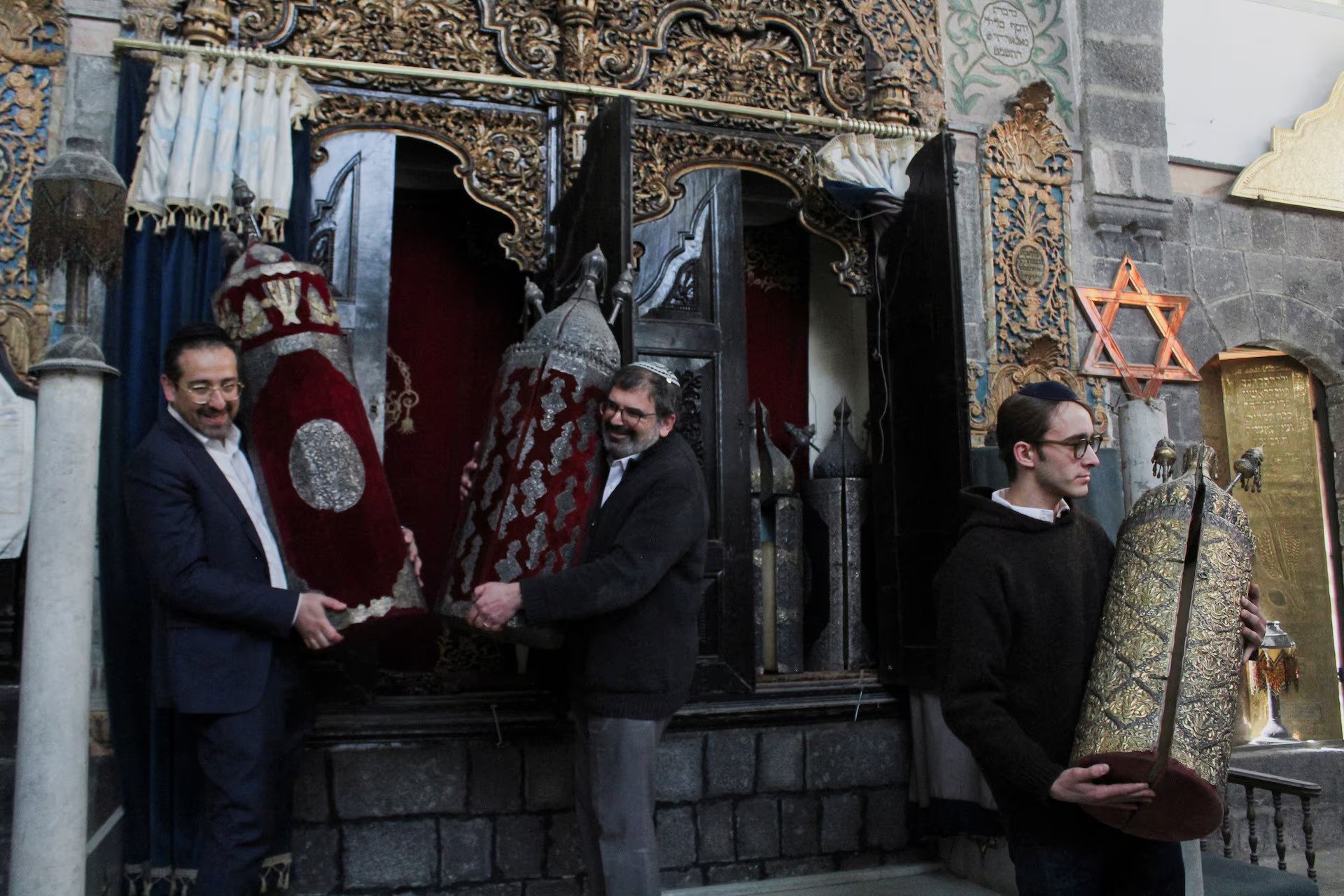
During their visit the group toured the Jewish cemetery in Damascus, paying respects at the tomb of Rabbi Chaim Vital, according to Haredi Israeli news portal JDN.
By Joshua Marks, JNS
A delegation of Syrian-Jewish Americans toured Damascus on Tuesday, with approval from the transitional government that took power following the fall of the Assad regime in December.
The visit, organized by the Syrian Emergency Task Force, a Washington-based advocacy group established in 2011 to support the then-Syrian opposition, included prominent figures such as Rabbi Yosef Hamra, a former leader of Syrian Jewry, and Rabbi Asher Lopatin, the director of Community Relations of Ann Arbor, Michigan’s Jewish Federation, alongside other Syrian Jews residing in the United States.
Syrian Jews return to visit their homes in Damascus for the first time in decades.
Facilitated by SETF, this latest delegation marks a new chapter for post-Assad Syria, one that welcomes all religions and sects. #Syria #syrianjews #syriajewishcommunity pic.twitter.com/7ebFMXRhUb
— Syrian Emergency Task Force (@syrianetf) February 18, 2025
During their visit the group toured the Jewish cemetery in Damascus, paying respects at the tomb of Rabbi Chaim Vital, according to Haredi Israeli news portal JDN.
They also visited historic Jewish sites, including the largely destroyed Jobar Synagogue, as well as the Al-Franj and Al-Raki synagogues and the Maimonides Jewish School.
Hamra, who was forced to leave Syria in 1992, described his return to his homeland after 33 years as deeply emotional. He urged Jews in the West to visit Syria and see its changes for themselves, suggesting that some might even consider returning.
His son, Henry, held up a Torah scroll alongside his father inside the Al-Franj Synagogue in the Jewish quarter in Old Damascus’ Bab Sharqi neighborhood. Founded by Sephardic Jews, it is the last synagogue in Syria used for worship by Jews.
Henry Hamra told Reuters that Syria’s foreign ministry has pledged to protect Jewish heritage sites following a meeting with the deputy foreign minister.
“We need the government’s help, we need the government’s security and it’s going to happen,” he said. “I want to see my kids come back and see this beautiful synagogue. It’s a work of art,” Henry added.
Moaz Mustafa, head of the Syrian Emergency Task Force, emphasized the significance of this visit—the first Jewish delegation in 33 years—and underscored the new government’s support for the return of all Syrians.
“Very few Jews remain in Syria. We want the international community to help rebuild synagogues and lift sanctions on Syria,” he said, assuring Syrian Jews that “your homeland is safe—you can return.”
JNS reported in January that the chief rabbi of the Syrian Jewish community in Israel wrote to the new leader of Syria, congratulating him on his victory in ousting the Assad dictatorship and encouraging him to preserve the heritage sites of the country’s historic Jewish community.
“For thousands of years, the Jewish community in Syria, despite being a small minority, has been an integral part of the rich and diverse fabric of the Syrian people,” Rabbi Binyamin Hamra wrote to Ahmed al-Sharaa in the letter.
“Throughout Syria are historical sites, ancient synagogues, and tombs of great Jewish leaders, which constitute cultural and religious heritage for Jews throughout the world,” he wrote.
Hamra’s father, Rabbi Avraham Hamra, served as the last chief rabbi of Syria from 1972 to 1992, before leaving for Israel via New York.
A mass exodus of thousands of Jews from Syria was made possible after then-Syrian president Hafez al-Assad lifted a travel ban on the country’s historic Jewish community, leaving less than 10 Jews in the Syrian capital.
Only two Jews, a brother and sister, remain in Syria today, according to Judy Feld Carr, a musicologist in Toronto who quietly rescued more than 3,000 Syrian Jews between 1977 and 2001.
A study from Justice for Jews from Arab Countries (JJAC), a Jewish-American organization, published in December, puts the number of Jewish residents in Syria at four.
According to the study, the value of property confiscated from Syria’s Jewish community exceeds $10 billion in contemporary terms.
The post First Jewish delegation in 33 years visits Damascus appeared first on World Israel News.